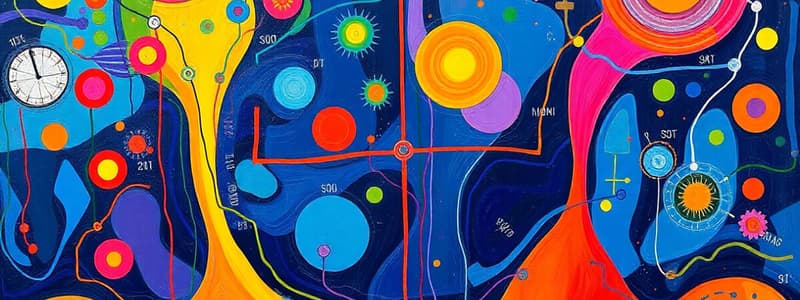Podcast
Questions and Answers
What is the Respiratory Quotient (RQ) for a person primarily utilizing carbohydrates for energy?
What is the Respiratory Quotient (RQ) for a person primarily utilizing carbohydrates for energy?
- 0.9
- 0.7
- 1.0 (correct)
- 0.8
Which hormone is primarily responsible for increasing metabolic rate by 10-15%?
Which hormone is primarily responsible for increasing metabolic rate by 10-15%?
- Thyroid hormone
- Growth hormone
- Testosterone (correct)
- Insulin
What effect does fever have on metabolic rate?
What effect does fever have on metabolic rate?
- Has no effect on metabolic rate
- Only affects protein metabolism
- Decreases the rate of all chemical reactions
- Increases the rate of all chemical reactions (correct)
How does prolonged fasting impact metabolic rate?
How does prolonged fasting impact metabolic rate?
What is the typical daily energy requirement for a resting individual?
What is the typical daily energy requirement for a resting individual?
What is the primary purpose of catabolism in metabolism?
What is the primary purpose of catabolism in metabolism?
Which macronutrient provides the highest energy yield per gram?
Which macronutrient provides the highest energy yield per gram?
Which component primarily reflects energy use in the body?
Which component primarily reflects energy use in the body?
Which hormone plays a significant role in the regulation of appetite and satiety?
Which hormone plays a significant role in the regulation of appetite and satiety?
How many kilocalories are liberated during the utilization of 1 liter of O2?
How many kilocalories are liberated during the utilization of 1 liter of O2?
Which of the following accurately describes anabolism?
Which of the following accurately describes anabolism?
What is the respiratory quotient (RQ) for a mixed diet?
What is the respiratory quotient (RQ) for a mixed diet?
What measurement technique involves assessing the amount of oxygen consumed by the body?
What measurement technique involves assessing the amount of oxygen consumed by the body?
In which state do nutrients generally undergo an increased rate of catabolism?
In which state do nutrients generally undergo an increased rate of catabolism?
Which nutrient component does not provide energy to the body?
Which nutrient component does not provide energy to the body?
Flashcards
Respiratory Quotient (RQ)
Respiratory Quotient (RQ)
CO2 produced divided by O2 consumed
RQ for carbohydrates
RQ for carbohydrates
1
RQ for fats
RQ for fats
0.7
RQ for proteins
RQ for proteins
Signup and view all the flashcards
Factors affecting metabolic rate
Factors affecting metabolic rate
Signup and view all the flashcards
Metabolism
Metabolism
Signup and view all the flashcards
Catabolism
Catabolism
Signup and view all the flashcards
Anabolism
Anabolism
Signup and view all the flashcards
Energy Balance
Energy Balance
Signup and view all the flashcards
Metabolic Rate
Metabolic Rate
Signup and view all the flashcards
Direct Calorimetry
Direct Calorimetry
Signup and view all the flashcards
Indirect Calorimetry
Indirect Calorimetry
Signup and view all the flashcards
Fuel Content (kcal/g)
Fuel Content (kcal/g)
Signup and view all the flashcards
Hypothalamus
Hypothalamus
Signup and view all the flashcards
Study Notes
Metabolism and Energy Balance
- Metabolism encompasses all biochemical reactions in the body
- Catabolism breaks down molecules, releasing energy (ATP)
- Anabolism builds up molecules, using energy (ATP)
- Hormones regulate these processes
- Food intake provides energy, used for work and body functions
- Excess energy can be stored as fat
Objectives
- Define metabolism
- Understand energy balance
- Explain feeding regulation
- Define metabolic rate and measurement
- Identify factors affecting metabolic rate
Metabolism
- Proteins, fats, carbohydrates, nucleic acids are broken down
- Food is digested, catabolism occurs, ATP is produced
- Catabolism fuels anabolism, body uses ATP produced
- Anabolism builds up body tissues and components
- Hormones regulate the process, balancing the body
Nutrient Pools and Metabolism
- Dietary fats, carbohydrates, and proteins are broken down
- Fats are stored as fat stores, excess glucose is stored as glycogen
- Glucose pool is used for energy, and glycogen stores
- Glycogenolysis (breaking down glycogen) and gluconeogenesis (producing glucose)
- Metabolism in most tissues is mainly for ATP
- Excess nutrients are generally converted/stored as fats
Food Intake and Energy
- Food intake is energy, including internal work (like blood pumping, cycling)
- Excess protein can be converted into excess glucose, eventually stored as fat
- Most ingested materials can be turned into fat
Fate of Nutrients in Fed/Fasted State
- Fed state uses glucose for energy, glycolysis, citric acid cycle
- Fed state stores glucose as glycogen, excess as fat
- Amino acids used for protein synthesis (after deamination), excess stored as fat
- Fasted state breaks down glycogen to glucose, producing more energy
- Proteins broken down, amino acids converted to glucose
- Triglycerides are broken into fatty acids and glycerol for production of energy
Energy Balance
- Anabolism and catabolism result in maintenance, growth, and use of nutrient stores
- Anaerobic catabolism in the cytosol produces limited amounts of ATP
- Aerobic metabolism in the mitochondria produces significant amounts of ATP
- Body uses ATP for various functions such as movement, transport and also endocytosis and exocytosis
Organic Material Consumption
- Creating ATP and heat through aerobic metabolism
- When consuming high nutrient amounts, anabolic activity is triggered, resulting in maintenance and storage.
Appetite and Satiety
- Hypothalamus controls eating, with feeding and satiety centers
- Hormones (ghrelin, leptin, CCK, Insulin, etc.) signal hunger and fullness
- Various peptides contribute to food intake regulation.
- Ghrelin is released from an empty stomach, stimulating food intake
- Satiety hormones like PYY and GLP-1 produce opposite effects
Energy Balance (Detailed)
- Energy intake matches energy output (work and heat)
- Input includes diet and psychological needs
- Output includes thermo-regulation plus work to support bodily processes
Metabolic Rate
- Metabolic rate (kcal/day) = (L O2 consumed/day) × (kcal/L O2)
- RQ (Respiratory Quotient): CO2 produced/O2 consumed
- Carbohydrates: 1
- Fats: 0.7
- Proteins: 0.8
Factors Affecting Metabolic Rate
- Exercise increases metabolic activity due to muscle contraction heat generation
- Age decreases metabolic rate from birth to old age
- Thyroid hormones increase metabolic rate
- Sympathetic stimulation increases metabolic activity of cells (e.g. glycogenolysis)
- Gonadal hormones (e.g. testosterone) and growth hormone increase metabolic rate
- Fever increases all chemical reactions, increasing metabolism
- Climate has an effect (people in hot climates have lower metabolic rates)
- Sleep is associated with decreased metabolic rate
- Malnutrition decreases metabolic rate with prolonged fasting
Studying That Suits You
Use AI to generate personalized quizzes and flashcards to suit your learning preferences.
Related Documents
Description
This quiz explores the concepts of metabolism, energy balance, and the biochemical processes involved in catabolism and anabolism. You'll learn about how hormones regulate these processes and the impact of food intake on energy utilization and storage. Test your understanding of metabolic rates and the factors influencing them.




